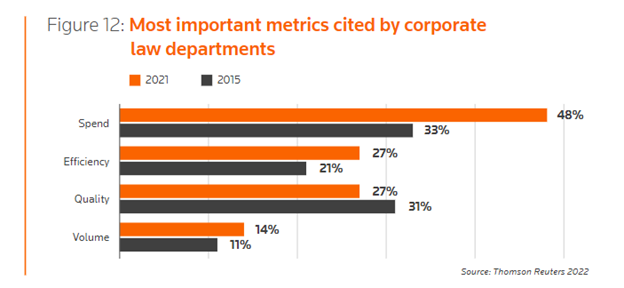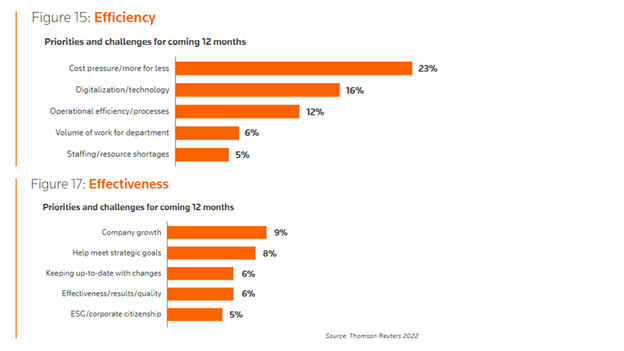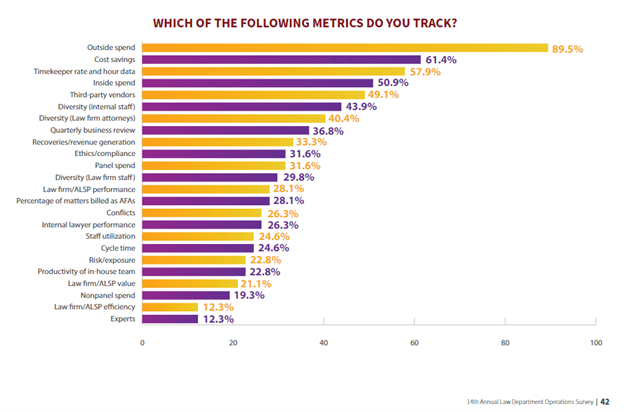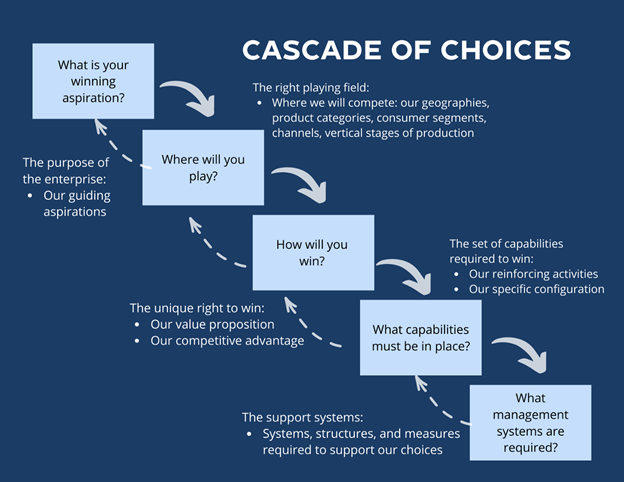Savings is not a strategy. Imagine a CEO opening an earnings call by celebrating the money the company “saved” on deal counsel and due diligence by not moving forward with an otherwise strategically vital acquisition. The stock would crater because leadership would rightly be judged as majoring in the minors.
As a line item, legal spend is a minor consideration. Rather, legal spend is better characterized as a relatively small investment that enables the business to execute on what matters.
Legal spend should be dictated by business needs. Those business needs are only escalating with the explosion in legal complexity. The increasingly law-thick environment in which businesses operate is having a profound impact on corporate top lines, bottom lines, valuations, and strategic opportunities. Trying to save money on legal is myopic—and excruciatingly common.
Savings, however, is an origin story. Most law departments came into being because a company did not “feel” it was getting sufficient ROI on spend with outside counsel. Law departments often emerge as more accessible, less expensive alternatives to outside counsel—and, unsurprisingly, many continue to frame themselves accordingly moving forward.
Legal operations teams often rise because the company, or its law department leadership, did not “feel” the company was getting sufficient ROI on both outside and inside counsel. Legal operations functions often materialize to bring rigor to external legal spend and increase the efficiency of internal legal resources through the application of process and technology—and, unsurprisingly, many continue to frame themselves accordingly moving forward.
Department-level cost control and efficiency are mission-critical tactics. But these are not strategic ends in and of themselves, despite often being treated as such. Yet the emphasis on spend and efficiency is increasing, per the Thomson Reuters 2022 State of Corporate Law Departments report, which compared this year’s survey responses to 2015:

Asked about their priorities and challenges for the coming 12 months, only 23% of respondents cite company growth, meeting strategic goals, or results. Compare that to the 51% of respondents who cited cost pressure, digitalization, and operational efficiency.


Graphic by the Blickstein Group
These findings comport with our own insights, having helped hundreds of law departments over the last several years.
We have mostly found smart, hardworking professionals who are task-oriented (deftly discharging the work in front of them) and totally overwhelmed (there is just too much work in front of them).
To the extent there is a future-oriented “law department strategy,” it is usually a vague assortment of efforts to rein in external costs, ask for more headcount (presented as a means to save on external costs), and procure/implement a grab bag of technologies (to make lawyers more efficient). The throughline is to “do more with less.”
The Blickstein survey is accurately titled Navigating in the Era of Doing More with Less. As explained in the survey, legal operations teams are “are laser-focused on doing more with less” as they “look for more sustainable efficiencies in the form of cost savings, automation and technology implementation” while “keeping an eye on the bottom line.”
Fair enough. Except for the last part. The law department does not have a “bottom line” in any meaningful sense.
Savings on legal is too small to be a rounding error. Per that 2022 TR report, “for global organizations with revenues of more than $1 billion, total legal spend on average is currently 0.12% of revenue.” The United States is an outlier at 0.33% of revenue, almost 3x the global average. Per the CLOC 2021 State of the Industry Report, the split is essentially even between internal and external legal spend (i.e., 0.17% of revenue each if we stick with the higher U.S. number and round up). Thus, cutting outside counsel expenditures by an arbitrary goal of 20% represents about 0.034% of company revenue (a fractional amount of a fractional amount). The same math holds for making inside counsel 20% more efficient.
For comparison, the WorldCC estimates that poor contracting processes cost the average company 9% of revenue. That is, a modest 10% increase in contracting efficacy has almost 3x the business impact of achieving the impossible: eliminating the entire legal budget.
Or if you need a louder, more specific headline to punctuate the point, consider that Meta’s valuation dropped 26% ($251 billion) in a single day due to the past, current, and future impact of “regulatory headwinds.”
There is no business logic to a company cutting investments in contracting excellence or skimping on effective navigation of the thickening regulatory environment solely for the sake of spending less on legal. From the perspective of business outcomes, “saving” money on outside counsel and making inside counsel more “efficient” are trivial pursuits.
Real strategy.
Just as there is no salient, independent “law department bottom line,” there is also no impactful, independent “law department strategy.”
The business has a strategy. That strategy is an integrated set of choices, including choices related to legal as a foundational support system (see here and here).

Graphic by AG Lafley
Law department strategy is therefore the translation of business strategy into requirements for the law department—i.e., what the law department must do to enable business strategy, today and in the future.
But few law departments frame their activities in this manner. To the extent a law department even has a target operating model (most do not), these largely remain oriented towards cost savings and making lawyers more efficient—rather than enabling business strategy, meeting business needs, delivering business value, driving business outcomes, etc.
This department-centric framing frequently extends to budget requests.
Jobs to be done.
A (i) law department spending more than necessary and meeting business needs is outperforming a (ii) law department spending less than necessary but not meeting business needs. More bluntly, a law department that fails to meet business needs is not doing its job. Securing sufficient resources is a prerequisite—i.e., success in asking for money is part of the job.
It is a hard job. No one wants to spend more on legal. The job is made all the harder by worthy competition for finite budget from other vital strategic enablers like marketing, sales, IT, etc.
The job is harder still because finance and procurement are intentional sources of friction within the enterprise. Every function always “needs” more money. Money is a hard constraint. Enterprise-wide spend discipline is essential business hygiene. While cost control is not itself a strategy, it is imperative for the optimal allocation of finite resources in the pursuit of strategic objectives. Corporations therefore employ people whose primary job it is to worry about maintaining and enforcing cost discipline—and, sometimes, law departments do, too.
This is the big leagues.
It is supposed to be hard. And no matter how expert a law department becomes at value storytelling, it is almost certain to be chronically underfunded relative to the growth in demand. Ours is not some pollyannish view of the corporate landscape where legal is expected to win every budget battle or is excused from maximizing the yield from each dollar allocated. Rather, it is to say that legal has a duty to meet business needs, and this not only requires legal expertise and operational excellence but also the political savvy to successfully navigate organizational context.
Hard though it may be, it is imperative that law departments excel at the art of the business case.

Graphic by LNS Research
Savings can only get you so far and eventually becomes counterproductive—i.e., it works until it doesn’t. Centering savings in the law department’s value narrative finds an eager audience precisely because it caters to the attractive fiction that the company can, and should, spend less on legal. Ultimately, re-enforcing this perspective makes an already hard job materially harder.
Scale, not savings. Internal preferences to spend less on legal, though understandable, have zero impact on an operating reality in which legal complexity is exploding and materially impacting corporate performance/opportunities. Ours is a nonlinear challenge. But law department budgets are, at best, increasing in a linear manner. The growing delta between business needs and legal resources is a material threat to the business.
Law departments will need more money. They will need more money to meet immediate needs in a traditional manner. They will also need more money to break from tradition and make better use of finite funds—i.e., to scale services to be able to meet future business needs. Law departments will need to pair “more with more” with “more for less” (while fighting the gravitational pull of “more with less”).
The future is about reducing the ratio of legal activity to business activity, as well as the unit cost of legal activity. Which brings us back to our old friends—savings and efficiency—but from a radically different perspective. We are not looking to reduce the total legal spend in raw dollars as some sort of separate, stand-alone, strategic business objective. Rather, we seek to maximize the business impact of legal while minimizing the relative costs thereof, with the former taking precedence over the latter. What those pretty words mean in practical terms is a discussion for another day.
About the Authors

Casey Flaherty is the co-founder and chief strategy officer at LexFusion, a curated collective of legal innovation companies (tech and services). A BigLaw and in-house alumnus, Casey has spent the last decade focused on improving legal operations in law departments and law firms. Casey is versed in process, tech, and strategic sourcing with an emphasis on transforming legal service delivery to drive better business outcomes at scale and pace.

Stephanie Corey is the co-founder and CEO of UpLevel Ops, a firm that provides next level legal ops consulting and strategy services. She is a widely respected veteran in Legal Operations with areas of expertise in Information Technology, System Implementations, Process Analysis and Improvements, Finance, Communications, and Administration. She has spent the better part of her career providing value-added services to Legal Departments, including building and deploying critical infrastructure to enable them to meet their business priorities.